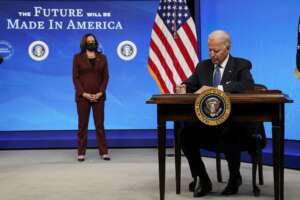

Celeste Drake, the director of the Made in America Office in OMB, said a new website run by GSA will help agencies and businesses find and use data to drive...
Federal contracting officers and grant managers are on the front lines of the Biden administration’s Made in America initiative.
New guidance from the Office of Management and Budget in June details the steps they must take to implement the President’s executive order from January.
Celeste Drake, the director of the Made in America Office in OMB, said the short and long term goals of the initiative are as much about increasing the goods and services bought from American companies as they are about sharing the data about how agencies make their buying decisions.

“The executive order makes the agencies accountable for their implementation and compliance with Made in America laws, and establishes the Made in America office to lead these efforts. These steps, we believe, are already having an impact by getting that focused, high level attention on waivers,” Drake said in her first interview since being named to the position in April. “We are bringing this whole of government approach to strengthen Made in America implementation and require agencies to continually review their processes and setting the stage for real, concrete improvements.”
To achieve concrete improvements, OMB’s memo starts with requiring agencies to name a senior accountable official to oversee the Made in America effort. Drake said beyond being the so-called “one belly button to push,” the official will focus their agency’s efforts to increase domestic sourcing to a high level in each agency.
“It’s important for the Made in America office as part of the OMB to have that key point of contact, and that point of contact can then do what they need to do internally to implement the policy or to get the information,” she said. “It really says that this administration is trying to take concrete steps to make sure that the federal government is maximizing its use of goods, services and materials that are made in America. It’s not just a throwaway line or a talking point. The message to agencies is we’re going to do this, and that’s why you’ve got to have a senior accountable official because there needs to be somebody that’s responsible for saying, ‘Yes, we are doing the things we need to do to make it in America.’”
Agencies had to name these senior officials by June 30. Drake said each agency took a different approach with some naming their senior procurement executive, others their grant manager or their CFO.
The major lift from the EO and the implementation guidance, however, is around the waiver process.
Drake said this is where the federal acquisition and grant making workforces as well as industry will see the real change.
The implementation guidance proposes new information to be included in non-availability waivers, including estimated value of the procurement, market research conducted and who approved the waiver.
Drake said despite several laws on the books like the Buy American Act or the Berry amendment or the Jones Act, the information about why agencies need waivers is hard to come by and understand.
“The Biden-Harris administration is leading on Made in America by instituting this first-ever governmentwide waiver review process,” she said. “We are bringing this whole of government approach to strengthen Made in America implementation and require agencies to continually review their processes and setting the stage for real, concrete improvements. The public’s most pressing concern is that they don’t have insight into the waiver process. The centralized process and the transparency is aiming to fix that. The public doesn’t know how hard contracting officers do work to comply with the Buy American Act and how hard they do work to identify suppliers, so by making sure that waivers are transparent and available to the public, we will ensure that domestic firms have an opportunity to find and fill gaps in the US supply chain. By analyzing the data we collect, we can help improve policies for domestic firms and workers as we work to build the economy back better.”
The General Services Administration also will build a public website where the waivers will be easy to find for businesses seeking to work for agencies.
GSA’s new website would ensure businesses and others wouldn’t have to slog through the Federal Procurement Data System (FPDS), which is renowned for being difficult to maneuver.
Drake said the new website will be a “one-stop shop” for all waivers for contracts and federal assistance funding and the Jones Act, which is a law from the 1920s that protects injured offshore and maritime workers.
“We’re going to try to present it in a way that is up-to-date and easy to use, so that we think about how we improve Made in America policies,” she said. “Also, firms that want to do business with the US government can find a one-stop shop and identify, ‘Hey, wait a minute, a waiver was issued for green widgets, we can make green widgets,’ and they won’t have to go to a multiplicity of websites to get the information they’re looking for.”
Drake said her office will work closely with the Office of Federal Procurement Policy, the Small Business Administration and other agencies to design and implement the new waiver process.
The Biden administration has yet to nominate an administrator of the OFPP. This person will play a key role in this initiative.
One area agencies commonly need a waiver for is information technology.
Drake said the EO requires the Federal Acquisition Regulations Council to report on existing constraints that might prevent the extension of Made in America requirements to commercial IT. The councils also will develop recommendations to address those challenges.
“The executive order identifies the need to make strategic investments to build domestic supply chain capacity, for instance, in silicon chips. As we continue to implement the executive order, we’re looking ahead to how we can work together with the critical supply chain goals, and how we can support domestic IT while ensuring that all agencies have the best access to the most innovative goods, regardless of their source from around the world,” she said. “The job of the Made in America office is to support the results of those critical supply chain reviews and recommendations as best as we can to maximize the production of goods and the provision of services domestically. It certainly does not mean that we will only buy goods that are made in America. And it certainly doesn’t mean we won’t be working with our allies and trading partners because one piece of making resilient supply chains is making sure that you don’t have simply a single source for critical components.”
Copyright © 2025 Federal News Network. All rights reserved. This website is not intended for users located within the European Economic Area.
Jason Miller is executive editor of Federal News Network and directs news coverage on the people, policy and programs of the federal government.
Follow @jmillerWFED




